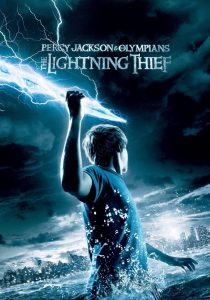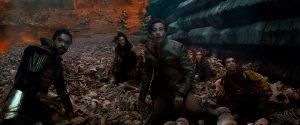
Beau is Afraid (2023)
From his darkest fears comes the greatest adventure.
Having terrified us with the one-two punch of instant horror classics Hereditary (2018) and Midsommar (2019), freshly-minted genre royalty Ari Aster pivots to comedy for a change of pace. Yes, comedy; Aster’s third film, Beau is Afraid, is freakin’ hilarious — although, as ever, your mileage may vary. Quite widely, in this case.
Joaquin Phoenix is the titular Beau (last name: Wasserman), who we first meet screaming in terror and shock upon the occasion of his own birth. Cut to 40+ years later, and Beau’s attitude towards the world hasn’t markedly improved. An anxiety-wracked schlub who lives alone in a weirdly, wildly dystopian city and confesses his fears to his avuncular, unnamed therapist (Stephen McKinley Henderson).
While the world in which Beau lives offers plenty of reasons to be fearful, it’s clear that most of his issues stem from a dysfunctional relationship with his mother, Mona (Patti Lupone), a successful businesswoman and a distant, often coldly cruel parent, who instilled in her son a terror of sex and a raft of other anxieties that have rendered him miserable as an adult. Inevitably, it’s his mother who sets Beau off on the quest that forms the backbone of the film; she dies after he misses a flight to visit her, and so Beau sets off, Mona having requested not to be buried in his absence. And things get very weird, very quickly — and they were plenty weird to begin with.
Beau is afraid. Beau is very afraid.
In all honesty, a plot synopsis isn’t going to do you much good here. Beau is Afraid is a sprawling, rambling, picaresque story drenched in neurosis and packed with bizarre characters and encounters, all more or less functioning on an allegorical rather than literal level. At 179 minutes, it’s certainly self-indulgent, but perhaps we should laud Aster for saving his big, overstuffed personal project for his third feature — most directors do that sort of thing for their sophomore effort — consider Richard Kelly’s ambitious, deeply flawed Southland Tales (2006).
A quick read of the film and we might glibly dismiss it as a messy meditation on mummy issues, which makes sense in the context of Aster’s body of work — both Hereditary and Midsommar deal with motherhood in their way, after all. The temptation to try and psychoanalyze Aster using his films as diagnostic tools is strong, but there’s more going on here.
Not all of which I completely understand, I must confess, but it’s not that the film is opaque so much as intricate, and you get the sense — perhaps incorrectly — that there is some key to found which will unlock its meaning, if only you can parse all of its symbols and metaphors correctly. I suspect many viewers will shelve Beau is Afraid after one viewing, but others will be compelled to rewatch it over and over again, notes app open, trying to divine its secrets.
Nope, nothing strange going on here …
Aster doesn’t make it easy, employing an episodic structure as Beau is propelled through a series of unsettling vignettes on his way to his mother, and the whole thing takes place in a kind of alternative present, a dark Universe B where all the violence, fear, and social disruption of our own terrible moment are cranked up to 11 (given how much Beau’s Jewish identity features here, feel free to Google Universe B + Kabbalah, but try not to get lost).
Perhaps the external universe is just a reflection of Beau’s mental state, and how literally we should take everything we see is difficult to say, but the city where he lives could sub in for the Manhattan of Escape From New York (1981) with very little tweaking. It’s a roiling, violence-plagued urban nightmare packed with crazed street people, strewn with rubbish, and soundtracked with a litany of smilingly sociopathic TV commercials and hysterical news spots. A bulletin about an insane, naked murderer dubbed Birthday Boy Stab Man presages the nightmarish figure’s intrusion into Beau’s life, but of course, every horror in this world eventually falls on Beau — he’s a modern-day Job.
It’s reminiscent, in its way, of Alex Cox’s sublime, surreal punk sci-fi Repo Man (1984) and of Boots Riley’s hip-hop remix of that film, Sorry to Bother You (2018), but a deeper and more relevant comparison might be the somewhat obscure 1985 Australian film Bliss by Ray Lawrence, based on the novel by Peter Carey. Bliss follows Barry Otto’s spiritually starved advertising executive after he survives (or does he?) a massive heart attack, only to find that his world is now a dark, sadistic mirror of the one he previously inhabited — indeed, it may literally be Hell. Like Beau is Afraid, Bliss is a kind of parable and similarly defies easy interpretation.
I had this dream the other night …
Beau’s world might not be hell, but it’s good enough for government work, and even moments of respite come freighted with the knowledge that the world will not lay off our hero for long. One such moment comes when, having been skittled by their car, Beau finds himself in the care of a creepily compassionate pair of suburbanites, surgeon Roger (Nathan Lane) and his wife Grace (Amy Ryan).
Lane is channeling pure Ward Cleaver vibes here, the picture-perfect family patriarch, but he and Grace are grieving for their soldier son and caring for his psychotic army buddy, Jeeves (Denis Ménochet). When that situation inevitably goes pear-shaped, Beau finds himself in the company of a forest-dwelling theatre troupe, “The Orphans of the Forest,” and we pause for a fantasy sequence where Beau imagines himself as the protagonist of their play, a man searching for his lost family — perhaps wishing his own quest was more meaningful, or at least held the possibility of a more satisfying conclusion. And then we arrive at his mother’s palatial estate …
Where some of you will no doubt be disappointed with how things wrap up, but, personally, I admire the film’s ambition and refusal to speak clearly — it intrigues me, even as it leaves me wondering if I entirely got the joke. Still, it is very funny, if your sense of humor is black enough, and it helps that we have the ever-watchable and completely committed Phoenix as our focal point, fearlessly essaying the tangled skein of anxieties that pass for his personality.
Beau is Afraid gets top marks simply because it’s such a singular expression of its creator’s voice, and while I noted that we shouldn’t try to analyze Aster through his work, you get the sense that he is putting a lot of himself into this one, and exactly how much and what we should make of it should keep the post-movie conversation going for a good few hours. It is vast; it contains multitudes. What those multitudes add up to is a matter for debate, but the debate is the point.
5 / 5 – Don’t Miss!
Reviewed by Travis Johnson
Beau is Afraid is released through Roadshow Entertainment Australia


